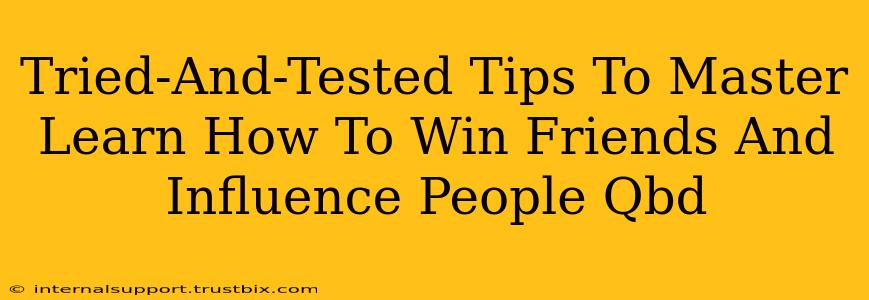Dale Carnegie's "How to Win Friends and Influence People" remains a timeless classic, offering invaluable advice on building relationships and achieving personal and professional success. But reading the book is only half the battle. Truly mastering its principles requires consistent application and mindful practice. This post dives into tried-and-tested tips to help you not just read, but truly master Carnegie's wisdom and reap its long-term benefits.
Understanding the Core Principles: Beyond Surface-Level Reading
Before diving into practical application, it's crucial to understand the foundational principles underpinning Carnegie's teachings. This isn't just about memorizing techniques; it's about internalizing a philosophy of genuine human connection. Focus on these key areas:
-
Fundamental Principle 1: Genuine Interest in Others: This isn't about superficial flattery; it's about actively listening, asking insightful questions, and genuinely caring about the other person's experiences and perspectives. Practice empathy and show that you value their input.
-
Fundamental Principle 2: Avoid Criticism, Condemnation, and Complaining: Negative language breeds negativity. Instead, focus on positive reinforcement and constructive feedback. Learn to express your concerns without resorting to judgment or blame.
-
Fundamental Principle 3: Arouse in the Other Person an Eager Want: This involves understanding the other person's needs and desires and framing your communication in a way that addresses them. Focus on the benefits for the other person, not just your own.
Practical Applications: Turning Theory into Action
Now let's delve into practical steps you can take to apply Carnegie's principles in your daily life:
1. Master the Art of Active Listening:
- Practice truly listening: Put away distractions, make eye contact, and focus on understanding the speaker's message, not just formulating your response.
- Ask clarifying questions: Show genuine interest by asking thoughtful questions that demonstrate you're paying attention and want to understand their perspective better.
- Summarize and paraphrase: Repeat back what you heard to confirm your understanding and ensure the speaker feels heard and understood.
2. Give Sincere and Meaningful Appreciation:
- Be specific: Instead of a generic "Good job!", point out specific actions or qualities you appreciate. "I really appreciate your thoroughness on that report; the detail was impressive."
- Be timely: Offer praise as soon as possible after observing the positive behavior.
- Be genuine: Your appreciation should be heartfelt and authentic, not forced or insincere.
3. Become a Master of Conversation:
- Find common ground: Look for shared interests or experiences to build rapport and create a sense of connection.
- Talk about the other person's interests: Show genuine interest by asking questions and actively listening to their responses.
- Avoid dominating the conversation: Let the other person share their thoughts and feelings; a conversation is a two-way street.
4. Seek to Understand Before Being Understood:
- Emphasize with others: Try to see things from their point of view, even if you don't agree.
- Avoid interrupting: Allow them to fully express themselves before offering your perspective.
- Show respect for differing opinions: Even if you disagree, acknowledge the validity of their perspective.
Measuring Your Success: Ongoing Self-Reflection
Mastering "How to Win Friends and Influence People" is a continuous journey, not a destination. Regularly reflect on your interactions and identify areas for improvement. Ask yourself:
- Did I truly listen to the other person?
- Did I offer genuine appreciation?
- Did I avoid criticism and judgment?
- Did I successfully build rapport and connect with the other person?
By consistently applying these principles and engaging in self-reflection, you'll not only improve your interpersonal skills but also build stronger, more meaningful relationships – the true essence of Carnegie's timeless wisdom. Remember, the journey of mastering these skills is a marathon, not a sprint. Consistent effort and self-awareness are key to unlocking the true potential within Carnegie's invaluable teachings.

